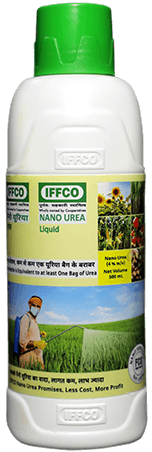Introduction
Nano-urea is a new technology in agricultural innovation, resulting in its reach to farmers at a much lower cost, biological control of soil and crops, and a functional role in human health.
What is Nano Urea?

Nano urea is a nanotechnological agricultural input that provides nitrogen to plants.
This compares to normal urea granules with desirable particle sizes of 50 nanometers and above. Hence it works much more than normal urea particles and because of its fine corners it helps in absorption of nutrients by the plants thereby improving the crop.
Is It Safe ?
It is absolutely 100% safe if used in the right dose. Scientists have proven in research that if a certain amount is used, it does not pose a significant risk to the environment, soil, and human health.
Is Nano Urea Organic ?
No, it is a synthetic fertilizer, it is not selected as organic fertilizer because it is derived from urea. Organic fertilizers, on the other hand, are produced from natural materials such as compost or plants. Although it is not organic fertilizer it does not have any harmful effect on the environment.
Cost Comparison: Nano Urea vs. Traditional Urea
When comparing the cost of Nano Urea with traditional urea, it is important to consider both short-term and long-term benefits. While the upfront cost of Nano Urea may be higher, its enhanced efficiency and nutrient uptake by plants can result in reduced fertilizer requirements over time. This can lead to cost savings and improved overall profitability for farmers.
Is Nano Urea Indigenous or Imported ?
Nano Urea is manufactured either abroad or in India. But Atmanirbhar India has planned to manufacture it in its own country which is entrusted to the Indian company IFFCO. Some sample files are published in the market. After maintaining all the formalities of February 2024, the new Nano-Urea will be launched in 2025.
Impact on Human Health (Is Harmful ?)
Nano urea may cause skin, eye and respiratory irritation. Repeated or chronic contact of urea with the skin can cause dermatitis, and blood containing high concentrations can cause body damage.
Now if it is used properly i.e. with all the protection then it has no harmful effect on the body.
Advantages of Nano Urea over Traditional Urea
NU offers several advantages over traditional urea, making it a promising innovation in the agricultural sector. Some of these advantages include:
- Enhanced nutrient absorption by plants due to smaller particle size.
- Reduced nitrogen loss through leaching and volatilization.
- Increased crop yields and improved productivity.
- Environmentally friendly, as it reduces nitrogen runoff and pollution.
- Increased water use efficiency, benefiting regions with limited water resources.
Benefits of Nano Urea in Indian Agriculture
1. Increased Nutrient Use Efficiency
It has been found to significantly increase nutrient use efficiency compared to traditional urea. Its controlled release mechanism ensures a steady supply of nitrogen to plants, minimizing wastage and optimizing nutrient uptake. This leads to reduced fertilizer requirements and cost savings for farmers.
2. Environmental Benefits
One of the major advantages of it is its reduced environmental impact. The controlled release mechanism reduces nitrogen leaching and volatilization, minimizing water pollution and greenhouse gas emissions. This eco-friendly nature of that promotes sustainable agricultural practices and helps preserve the environment.
3. Enhanced Crop Productivity
By providing a more efficient and targeted nutrient supply, It enhances crop productivity. It promotes healthy plant growth, improves yield, and enhances the quality of agricultural produce. Farmers using NU. have reported increased crop resilience to stress conditions, resulting in better overall performance.
Is Nano urea available in market?
yes, it’s available in market. In some of the places(area) Some sample files are published in the market. After maintaining all the formalities of February 2024, the new Nano-Urea will be launched in 2025.It is reported by growers that it is more productive and works better than normal urea.
Conclusion
It represents a significant advancement in agricultural technology, offering improved nutrient delivery and increased crop yields. It is a safe and effective option when used correctly, providing benefits such as enhanced nutrient absorption, reduced environmental impact, and improved overall profitability. With ongoing research and development, It holds tremendous potential in addressing the global challenges of food security and sustainable agriculture.
